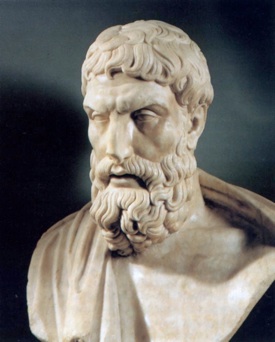
His philosophy lies in the pursuit of happiness of Hellenistic systems like Stoicism —with which Epicureanism polemized— and scepticism. For Epicurus the aim of philosophy is to heal the fears experienced by the man, in particular fear of the gods and death. In fact, the cure for unhappiness is summarized in the famous «tetrapharmakon»: Do not fear the gods, do not fear death, it is easy to get pleasure, pain is easy to avoid.
Epicurus divided his philosophy into canonical, physics and ethics.
The canonical or Epicurean theory of knowledge is fundamentally materialistic and empiricist. The knowledge that we get is reduced to the senses, and all five senses can be reduced to the touch. Through our senses we contact with external bodies and acquire knowledge. The senses never deceive us, the error lies in the inferences we extract from the information that they provide.
The physics derived from the Epicurean atomism of Leucippus and Democritus with some changes introduced to save freewill and individual freedom. Everything is reduced to atoms and void. Atoms are invisible due to their smallness, indivisible, eternal and immutable. They move in a void -because if there were no void, they could not move- from eternity, and join to form compounds, which are the bodies that we see and felt. The atoms do not have the properties we observe in the compounds; only have weight, shape and magnitude. All other properties that appear in the world are the result of the combination and arrangement of atoms in the compounds. Except atoms and void, nothing is eternal: the soul, the worlds and the bodies will be dissolved one day and their atoms will be able to join with others to form new compounds. The only compounds that are not subject to destruction are the gods, who replaced continually their losing atoms, thereby becoming immortal.
The Epicurean ethics is materialistic. Justice and values that rule society are not eternal as in Plato, but the result of the convention. The aim of the wise man is happiness, and happiness is the state that provides the untroubledness or ataraxia. How can we achieve it? Through pleasure. However, for Epicurus pleasure was the absence of pain. What does a just born child desire? Not to be hungry, not to be thirsty, not be not cold. The man who has this basic needs satisfied and has the hope to be satisfied in a future would rival Zeus in happiness. The Epicurean pleasure is not the dissolute’s; it is provided by peaceful life without fear and pain. Epicurus gave great importance to friendship. In fact, his school was a group of friends where slaves and women were admitted, some of them not very good reputed.
According to Diogenes Laertius, Epicurus wrote more than any other philosopher before him. It seems that he left about 300 volumes, unfortunately, their works are lost almost entirety.
Of this immense work, Diogenes Laertius saved and published in his book Lives, doctrines and rulings of the most illustrious philosophers, the Letter to Herodotus, the Letter to Pythocles and the Letter to Menoceus, even the second —although Epicurean for its content— is considered spurious.
In addition to these three letters, we own the so called Basic Doctrines, a series of brief advices, focusing mainly on ethics, several scattered fragments, and the so called Vatican Sayings, a collection of sentences discovered in 1888 in a Vatican codex, some which are identical to the Basic Doctrines.
To this scanty material for the study of first hand sources of Epicureanism, we have to add the collection of papyri that are recovering slowly from the library of Philodemus of Gadara, an Epicurean who lived in the first century AD. His house, located in Herculaneum, in the Bay of Naples, had a library with many rolls of papyrus of philosophical works, many of which were books of Epicurus himself. With the eruption of Vesuvius in 79 AD the town was completely buried, and so and forgotten remained the papyri for centuries, until in 1738 Herculaneum began to be excavated. The papyri found in the library of Philodemus are completely charred and without unrolling, so that a large technical expertise and philological skills are needed to recover their content. This work was carried out slowly by experts worldwide. You can view information about the papyri here and about the current state of the research here.
Besides these works of Epicurus himself, we have the great poem of Lucretius, De Rerum Natura, containing a faithful exposition of Epicurean philosophy in verse; it constitutes an invaluable source for knowledge of Epicureanism.
Finally, we have the inscription of Diogenes of Oinoanda to which we dedicate this website, although not written by Epicurus, it is an orthodox reflection of his teachings.
On the death of Epicurus there were several epicurean centres scattered around the Greek world, and with the rising of the Roman Empire, Epicureanism moved to Rome where it had influence in some circles close to Julius Caesar, who seems that sympathized with this philosophy.
Epicureanism was declining, and in the fifth century it had virtually disappeared. During the Middle Ages it remained practically unknown, and only after some timid attempts to recover it during the Renaissance, the work of Gassendi (1592-1655) rescued if from oblivion. Some illustrated materialists like La Mettrie and Bayle sympathized with Epicureanism, as did Karl Marx, ho just dedicated his doctoral these, Difference between the Democritean and Epicurean philosophy of nature to the difference between these two atomist philosophers.
In the late nineteenth century, Hermann Usener published Epicurea, a collection of some 600 fragments and testimonies of Epicurus, which is the magnum opus for the study of Epicureanism.
Today there are many studies on Epicurus and Epicureanism. Nowadays there are plenty of studies on this subject, and in internet you can also find a lot of information about Epicurus. There are strongly recommended these sites: epicurus.gr Epicurus.net and newepicurean.com

